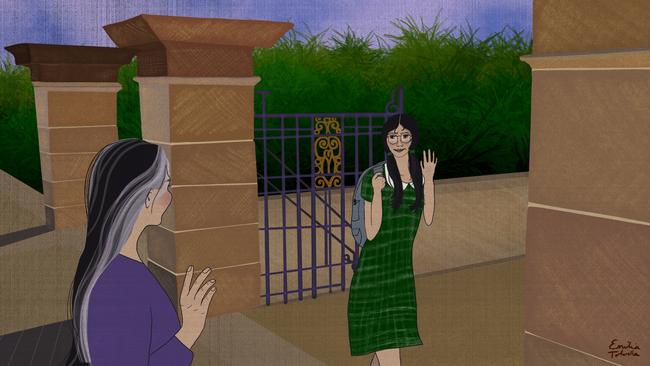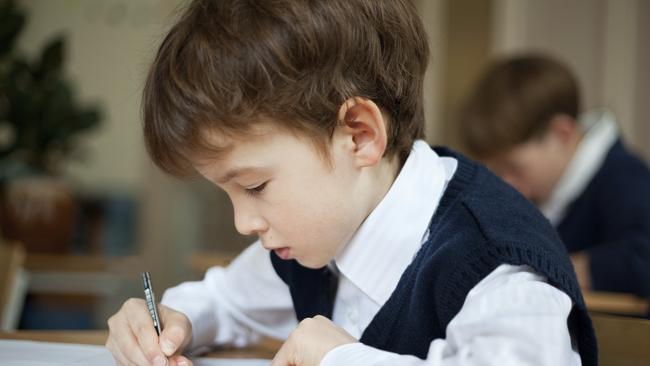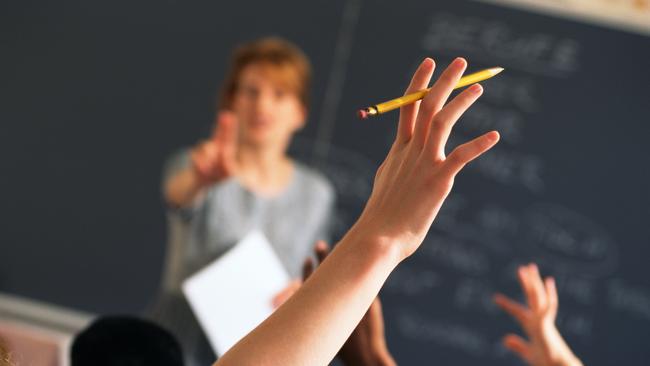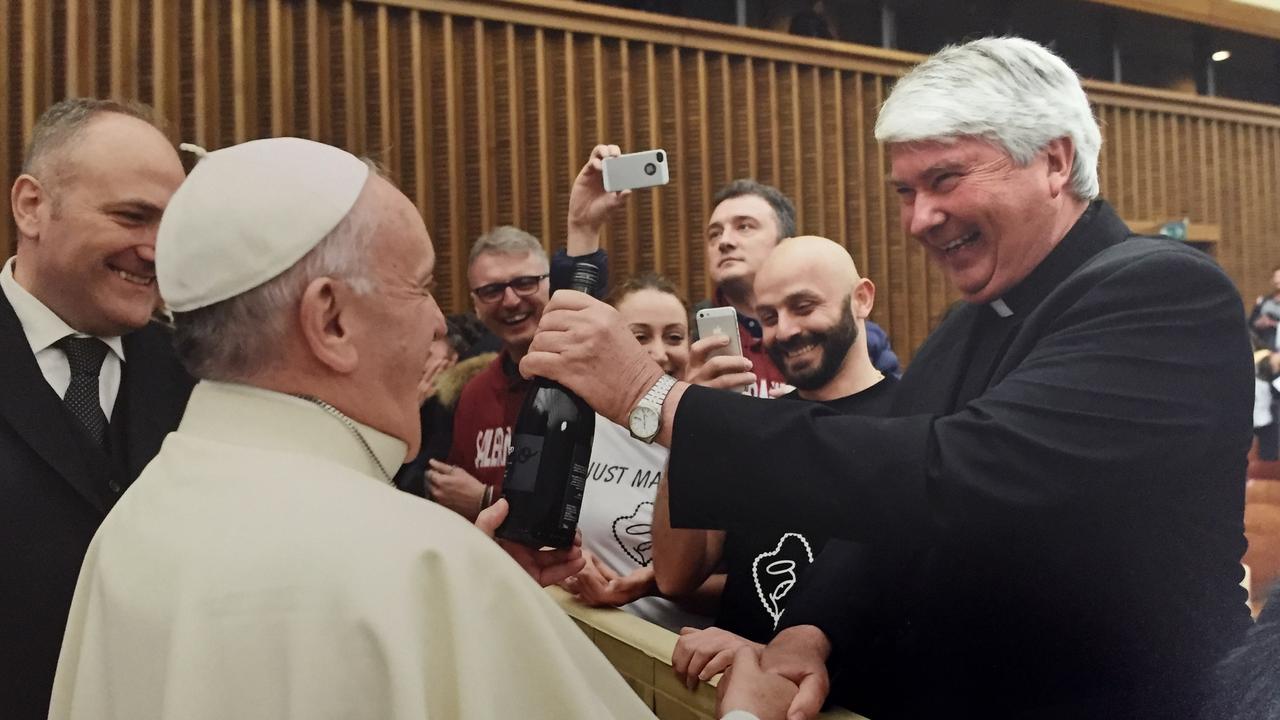Hard choices: The ‘rich kids’ narrative that irks private school parents
For every Gatsby family there are scores of parents working their guts out to scrimp and save to pay for what they see as the best education for their children.

The school year approacheth and it is time for journalists to round up the usual educational suspects for pillorying and execration. Naturally, private schools are first into the dock.
Everybody knows the charge sheet. Private schools are the exclusive preserve of rich kids born to rich parents. They trade in educational privilege, allowing plutocratic families to buy good ATARS.
All private school families are rolling in it. The monumental fees charged by these schools are a fleabite in parental income. They spend more on their weekly Gwyneth Paltrow-approved enema than on yearly school fees.
The kids are the Caligulas of the quad. They are hyper-privileged brats without manners, morals or genuine intelligence. Their bedrooms sport hand-signed posters of Prince Andrew.
These schools teach privilege, contempt for anyone who actually works for a living and how to execute a firm handshake in your future lucrative life in merchant banking. The salary of headmasters exceeds the annual revenues of most African republics. Some of these rotten institutions even have a religious inspiration. They produce not only social criminals but bigoted social criminals.
All in all, private schools are the educational equivalent of a particularly persistent brown snake. They should be beaten to death but made to feel it as they expire.

In terms of practical policy, this can be achieved by denying them all access to public funding, despite the fact there must be one or two private school families who actually pay tax, as opposed to squirrelling it away in holiday homes in the Bahamas. Better still, private schooling should be banned altogether by government decree, like free thought and murder. That way every student can equally suffer the misery of an epically overwhelmed public school system as it struggles to cope with the consequent invasion of little Lord and Lady Fotheringhays.
This is probably where the progressive educational narrative starts to unravel like the storyline of an over-frocked Baz Luhrmann musical. It actually is the right of parents – not education unions or post-constructionist school community collectives – to choose the type of education they want for their children. No, really, it is.
You can prove this to any Fitzroy correct-thought reading group by citing their favourite document, the UN Universal Declaration on Human Rights. Article 26, paragraph three: Parents are entitled to choose the form of education for their children. Read it and weep.
Or not. When it comes to refugees, persecuted balloon artists and Julian Assange, the UDHR is holy writ in Brunswick East. But just because it gives an execrable gang of educational opportunists a positive right to choose their children’s place of education is no reason to let them exercise it.
So let us engage with the stereotype of private school families as greedy hyenas gorging on the carcass of unequal education.
Truth is, private school parents, like politicians and real estate agents, are a mixed lot. Some are indeed very wealthy. They do buy education for their children much as they buy them their first sports car. Their progeny really are called Algernon and Tradescantia.
But these are the classic exceptions that do not prove the rule. For every Gatsby family there will be scores of parents working their guts out to pay for what they see as the best education for their child. They will scrimp and save, go into debt, forgo any number of consumables to secure the future of their son or daughter.

Of course, there will be an enormous number of households that cannot afford private schooling whatever they do. But among Julia Gillard’s working families and John Howard’s battlers there are many parents making very hard choices. Is it holidays or our idea of the best education? Do we need a new(ish) car? Whatever happened to overseas travel? Why is our television an electronic antique? This is the hard discipline of a great many, if not most, private school families: dutiful present pain in the hope of a better future for hopefully grateful children.
I know this story from hard experience. When we were much, much younger, my wife and I decided on private schooling for our four children. Admittedly, a large part of that choice was religious. We are Catholics and were determined that our children would be educated in the Catholic tradition.
But we did not have to choose high-fee Catholic schools, effectively the private schools of the Catholic system. We did that because we believed they would provide the best education for our three boys and one girl.
What a grinding financial commitment that was. Our car was the laughing-stock of Melbourne’s eastern freeway. My one suit was not infested with rats but only because rats have standards. Nights out were rationed to birthdays, if we could afford it.
But most of all I remember the exhausting accounting, never my strong suit. We would save manically over the Christmas break between school years. Then we would gradually draw down on that money, partially replenishing it with allocations from each of our pay cheques. Eventually it would be the dreaded credit card season.
Funds would run out and fees would be put on credit. Come the Christmas break, we would start to pay down the debt and the whole usurious process would begin again. This will be the story of a great many private school families.
I was familiar with the whole process from experience as a schoolboy. I was sent to St Kevin’s, a very good, quite expensive Catholic school in Melbourne. When my modestly paid journalist father died at the age of 47, we found he owed significant sums to moneylenders just to have paid my school fees. He never graduated beyond his battered HR Holden.
St Kevin’s, along with numerous other institutions, was and remains a good corrective to the aristocratic image of private schools. The school’s main feeder suburbs are along the Glen Waverley train line, a pretty middling route to kleptocracy. It always has been a school where both parents worked to pay the fees, sacrifice was inevitable and intergenerational duty was to the fore.
Yes, there are kids from Toorak and Brighton. But there are many more from Mount Waverley, and a significant cohort from out Broadmeadows way. Whatever the porphyry realities of Melbourne and Geelong grammars, the prototype private school is not fed by the idiot sons of the squattocracy.
This is without even admitting we would not recognise most private schools if we drove past them. The vast cohort of Catholic schools are technically private, in the sense they have their own fees and are not owned by government, even if they receive significant government funding. Overwhelmingly, these schools service middle and lower-income families, trying to keep fees low and standards high.

Then there are the modest fee, non-Catholic religious schools popping up around the country, particularly those in regional areas. They may not have fancy gates but they provide vital diversity and opportunity to many families far from the honey pot.
The pivotal question is why so many aspirational families do choose to spend their hard-saved money sending their children to private schools in the first place.
The hope that their offspring will achieve high ATAR scores admittedly is a factor. Despite some gratifyingly high-score public schools – even in lower socio-economic areas – it remains true that a given student is likely to achieve a higher score in a private school. As the ATAR is the only simple, numeric score parents will receive for their child, it is valued accordingly, despite its limitations.
The problems of the ATAR system are multifarious. An ATAR corresponds more closely to a student’s postcode than capacity. It contains impenetrable algorithms and scaling mechanisms. The overwhelming desire for a higher score discourages students from studying hard subjects such as higher mathematics and sciences, and has led to the virtual demise of languages other than English. Real humanities and true social sciences, such as history and geography, have gone the same way.
Beyond this, the ATAR obviously cannot measure vital human attributes such as ethics, problem solving and relationship skills. Little wonder virtually all universities use the ATAR as only one element in the selection process. We have paid a high price for a limited arithmetical label of student success.
But an increasing number of parents are focusing on the real prize of education. This is what a school turns out as its finished human product. What sort of human being does it produce? Are they nice or nasty, ethical or ruthless, honest or deceptive? Are they good-mannered and respectful to those below them, as well as those above them?
It is this type of values dividend that also is central to the choice of private schools by many parents.
Of course, it is not true that public schools typically turn out despicable cads. They self-evidently do not. Plus the reality is that they do not have the opportunity of private schools to pick and choose their students and mould their student body. Yet many parents who are focusing on what sort of values their children will take out into the world see private schools, especially those with a broad religious context, as having a decisive edge. They are unconvinced that public schools with a purely secular, cookie-cutter approach to values and ethics have the same moral payload.
The simplest illustration here is the Catholic school system. That system does not enrol only Catholics. Across the country, tens of thousands of non-Catholics – atheists, agnostics, members of other Christian denominations, Muslims and Hindus – place their children in Catholic schools precisely because they want an education with a values base.
The proposition seems to be that if I want values in the education of my child, it is better to have values that are differently expressed to my own rather than no values at all.
Remarkably, this phenomenon has survived the horrific child abuse within the Catholic education system.
At a much lower level, it has simply moved past rather sensationalised media reports of students from elite Catholic schools – including my own alma mater – delivering abject performances such as abusive, sexualised chants on Melbourne trams.

Values, even breached values, are an ace in the card game of school enrolments.
Of course, the pivotal question is how to recognise a school that actually is producing outstanding people rather than ATAR numerals. Partly, this comes down to understanding what values you want your kids to have. There is enormous room for variation, but it is a fair bet that most parents value a work ethic, decency, kindness to others, a capacity to maintain human relationships and a willingness to contribute to society without reward.
They also want an ability to see beyond purely material things. Students should graduate as humanists, in the old sense of the word. They should value other people simply because they are people, and understand that humans are more than a sequence of life events and meaningless death.
For all schools, it is much harder to project this moral brand than to be an ATAR factory. Realistically, it has to infuse all of its activities – enrolment, curriculum, teaching and student welfare – with this values-based approach. Mere rhetoric is fatal here. Parents looking for an education of ethics can smell fakery like rotten fish.
Ultimately, it comes down to word of mouth. Schools that factually produce wonderful people are surprisingly hard to miss. By their fruits shall ye know them.
When I was a mere dean in Western Australia, trying to sell my new law school, I visited dozens of schools, both private and public.
I came to know most of the metropolitan secondary education system intimately, school by school. After a few years I was staggered to realise that particularly within the highly individualised private sector it was possible to identify a general type of student produced by each school.
Of course, there were always exceptions, but it was remarkable how easily you could identify the school of a university law student simply by talking to them.
The typology was striking. One elite girls school produced young women who were critically thoughtful but open-minded, courteous and committed to serving their community. The exactly equivalent school a couple of kilometres away let loose self-interested harpies. One important Catholic girls secondary college fostered the growth of humane values in their students and reinforced those values with intellectual depth. Its rival was a bureaucratic bucket of shallowness turning out not-very-nice partygoers.
It was the same with boys schools. Again, within a few thousand metres of each other, there was a school of fine, broadly educated young men with values to which I could only aspire, and a privileged hotbed of self-obsessed hoons.
Ultimately, if parents really want personal formation rather than a functional education, the only way is to observe the final product and listen to the experience of other parents.
Just occasionally, though, you will see education with lucid values playing out in front of your eyes. Two examples in Sydney have always stayed with me.
I once watched an inter-school rugby game where one side was annihilating the other. Their cocksure players were whooping, celebrating and laughing at their miserable opponents. At halftime their coach berated them in the hearing of every spectator, saying that one day an even better team would smash them in the same way, and would they like that team to humiliate them with hoots and jeers? What sort of men are you? It was a very quiet second half.
I also knew a former student from an elite school who was passionately interested in Indigenous history and determined to make a practical difference for Indigenous people. He wanted to do the year 12 unit in Indigenous studies. That unit notoriously is radically scaled down, presumably on the assumption it is taken only by low-achieving Indigenous students, overmarked by Indigenous teachers. The student was clever enough to get into his desired university course through his other units, but a deflated mark in any unit affects a school’s overall ATAR profile.
Unhesitatingly, the school enrolled the student in his subject of choice and commitment.
These are schools of genuine quality where I would be privileged to send any child of mine.
Greg Craven is former vice-chancellor of the Australian Catholic University.







To join the conversation, please log in. Don't have an account? Register
Join the conversation, you are commenting as Logout